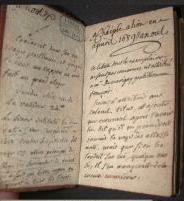This article includes a list of general references, but it lacks sufficient corresponding inline citations. (October 2016) |

Killing No Murder is a pamphlet published in 1657[1] during The Protectorate period of the English Interregnum era of English history. The pamphlet of disputed authorship advocates the assassination of Oliver Cromwell. The publication was in high demand at the time of its distribution. Cromwell was said to[who?] have been so disturbed after the publication of Killing No Murder that he never spent more than two nights in the same place and always took extreme precaution in planning his travel.

The pamphlet asks three questions, which highlight the purpose of the document (from page 9 of the 1743 re-print):
- What is a Tyrant?
- Is it honourable to kill a tyrant?
- Will the outcome of killing a tyrant be beneficial to the state?
The author(s) of the pamphlet highlight arguments and statements from Aristotle, Plato, Plutarch, Solon's law, Xenophon, Cicero, and other historical writings, as well as contemporaries from the 17th century (e.g., Hugo Grotius) to make the case that to murder a tyrant is (and has forever been) an honourable act. The full document describes the traits of a tyrant in 14 points, of which the most prevailing are:
- Prior military leadership service—tyrants are often former captains or generals, which allows them to assume a degree of honour, loyalty, and reputability regarding matters of state
- Fraud over force—most tyrants are likely to manipulate their way into supreme power rather than force it militarily
- Defamation and/or disbanding of formerly respectable persons, intellectuals, or institutions, and the discouragement of refined thinking or public involvement in state affairs
- Absence or minimalisation of collective input, bargaining, or debate (assemblies, conferences, etc.)
- Amplification of military activity for the purposes of public distraction, raising new levies, or opening future business pathways
- Tit-for-tat symbiosis in domestic relations: e.g. finding religious ideas permissible insofar as they are useful and flattering of the tyrant; finding aristocrats or the nobility laudable & honourable insofar as they are compliant with the will of the tyrant or in service of the tyrant, etc.
- Pretenses toward inspiration from God
- Pretenses toward a love of God and religion
- Grow or maintain public impoverishment or instability as a way of removing the efficacy of the people's will
"First, therefore, 'a Usurper that by only force possesses himself of government, and by force only keep it, is yet in the state of war with every man,' says the learned Grotius, 'and therefore everything is lawful against him that is lawful against an open enemy, whom every private man hath a right to kill.[2]'"
Other key points:
-As one who submits to no law, a tyrant is not an entity *of* the state so much as an entity outside of it, or above it. As such, a tyrant should not have the protections due through law, or any defence from law since the tyrant acknowledges no laws dictating his own actions. "He that flies justice in the courts, must expect justice in the streets."
- ^ Tedder, Henry Richard (1911). . In Chisholm, Hugh (ed.). Encyclopædia Britannica. Vol. 20 (11th ed.). Cambridge University Press. p. 660.
- ^ "Killing No Murder, page 11" (PDF).